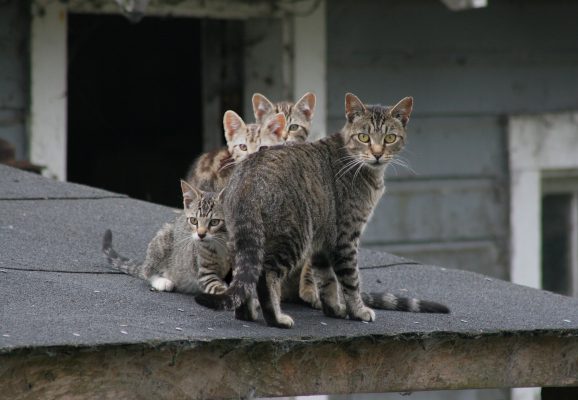Public Safety Issues Statement on Feral Cats
November 16, 2017
Feral cats might as well be the unofficial mascot of Fordham University; at Rose Hill, they are a common sight when walking across the campus. Up until this week, members of the Fordham community and the feline denizens seemed to peacefully coexist. The subject of a myriad of Instagram posts and even the topic of a Facebook page, many Fordham students do not just tolerate them, but treat the cats as pseudo-pets.
Perhaps that amicable perception of the campus’s feral cats is what led two Fordham students to pet and play with them, leading to one of the students being bitten on the finger by one of the animals and the other being scratched on the hand. These incidents prompted the Department of Public Safety to send a university-wide email on interacting with the cats and what practices Fordham has in place to address their presence.
“Members of the University community should not approach any feral cat or other wild animal, either on or off campus,” the email from John Carroll, associate vice president for public safety, said. “In particular, never feed, handle, touch, grab, or make sudden movements toward the animals.”
The student who was bitten was prescribed a rabies vaccination after consultation with University Health Services. The other student declined treatment, but plans to see his personal physician, according to the email. Even though there were only three confirmed cases of rabies in humans in the U.S. in 2015, the email notes that it is standard medical protocol to vaccinate anyone who was potentially exposed if the animal cannot be tested or quarantined. Additionally, Carroll writes that cat bites “inject a great number of harmful bacteria under the skin and often into the muscle, leading to serious infections if not treated promptly and aggressively.”
Although these incidences are new, the feral cats have lived on and around the Rose Hill campus for several years. Fordham even has a feral cat management program, engaged with a specialist that oversees Fordham’s non-lethal trap, neuter, release (TNR) program, according to the email. The ASPCA endorses TNR as the “only proven humane and effective method to manage community cat colonies.”
Along with following the ASPCA, Fordham’s TNR program follows the recommendations of New York City’s Feral Cat Initiative. Part of the Mayor’s Alliance for NYC’s Animals, the Initiative’s goal is “to humanely reduce the population of community cats in NYC,” according to its website. TNR is also not a new point of discussion around feral cats at Fordham; in 2015, a GoFundMe campaign was created to support TNR efforts for Fordham’s feral cats.
Carroll stated that if anyone sees a cat on campus that does not have a “notch” in its ear–how they are surgically marked after they have gone through the TNR program–they should contact Campus Custodial Operations at (718) 817-3975. Members of the Fordham community can also contact Public Safety at (718) 817-2222 if they have any questions.














Al-Hajji Frederick H. Minshall • Nov 16, 2017 at 8:27 pm
The worst incidence of human rabies exposure in US history was from a “TNR” feral cat colony in Concord, NH in 1994. A rabid raccoon attracted to the kibble left out by the idiot caretakers infected four colony kittens.
B-b-but WAIT! Isn’t TNR supposed to “reduce” feral cat populations by trapping, neutering and re-abandoning them? What’s wrong with this picture?
To continue: said idiot caretakers then, without quarantining or properly vetting their kittens, “adopted” them to a local pet shop, which in turn distributed them to the public. Ultimately 665 people had to be treated with Post-Exposure Prophylactic inoculation to protect them from possible rabies, which cost that town $2 million.
Someone should perhaps show this comment to that student simpleton who refused treatment–if he waits till he gets symptoms, it’ll too late. Ah well–natural selection is always on the lookout for the weak and stupid. It’ll cure all his ills.